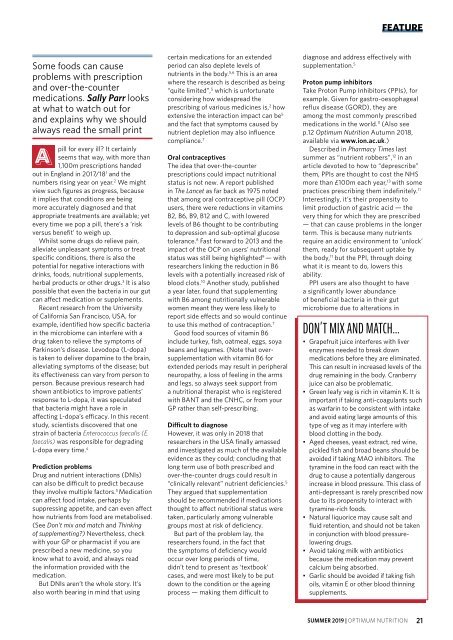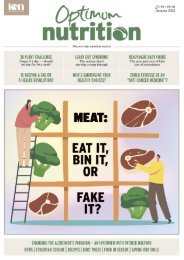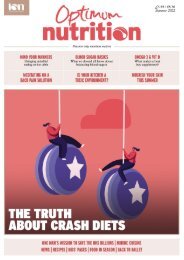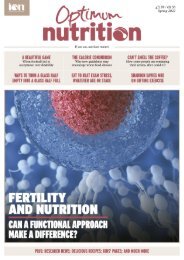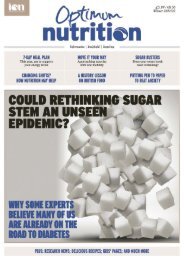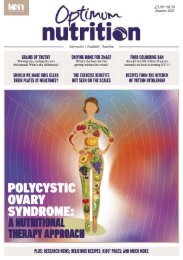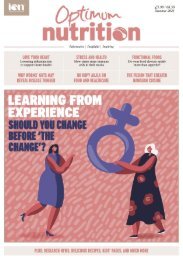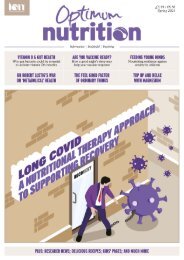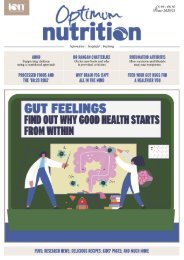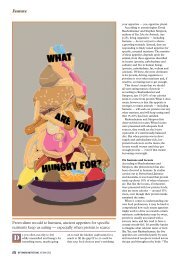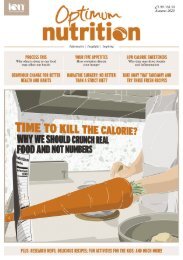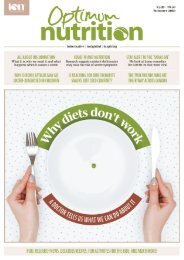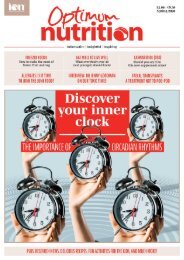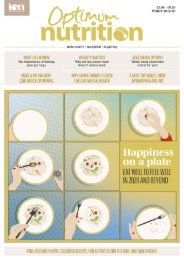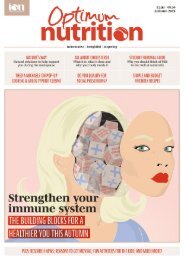Careful chemistry
Some foods can cause problems with prescription and over-the-counter medications. Sally Parr looks at what to watch out for and explains why we should always read the small print
Some foods can cause problems with prescription and over-the-counter medications. Sally Parr looks at what to watch out for and explains why we should always read the small print
You also want an ePaper? Increase the reach of your titles
YUMPU automatically turns print PDFs into web optimized ePapers that Google loves.
FEATURE<br />
Some foods can cause<br />
problems with prescription<br />
and over-the-counter<br />
medications. Sally Parr looks<br />
at what to watch out for<br />
and explains why we should<br />
always read the small print<br />
A<br />
pill for every ill? It certainly<br />
seems that way, with more than<br />
1,100m prescriptions handed<br />
out in England in 2017/18 1 and the<br />
numbers rising year on year. 2 We might<br />
view such figures as progress, because<br />
it implies that conditions are being<br />
more accurately diagnosed and that<br />
appropriate treatments are available; yet<br />
every time we pop a pill, there’s a ‘risk<br />
versus benefit’ to weigh up.<br />
Whilst some drugs do relieve pain,<br />
alleviate unpleasant symptoms or treat<br />
specific conditions, there is also the<br />
potential for negative interactions with<br />
drinks, foods, nutritional supplements,<br />
herbal products or other drugs. 3 It is also<br />
possible that even the bacteria in our gut<br />
can affect medication or supplements.<br />
Recent research from the University<br />
of California San Francisco, USA, for<br />
example, identified how specific bacteria<br />
in the microbiome can interfere with a<br />
drug taken to relieve the symptoms of<br />
Parkinson’s disease. Levodopa (L-dopa)<br />
is taken to deliver dopamine to the brain,<br />
alleviating symptoms of the disease; but<br />
its effectiveness can vary from person to<br />
person. Because previous research had<br />
shown antibiotics to improve patients’<br />
response to L-dopa, it was speculated<br />
that bacteria might have a role in<br />
affecting L-dopa’s efficacy. In this recent<br />
study, scientists discovered that one<br />
strain of bacteria Enterococcus faecalis (E.<br />
faecalis) was responsible for degrading<br />
L-dopa every time. 4<br />
Prediction problems<br />
Drug and nutrient interactions (DNIs)<br />
can also be difficult to predict because<br />
they involve multiple factors. 5 Medication<br />
can affect food intake, perhaps by<br />
suppressing appetite, and can even affect<br />
how nutrients from food are metabolised.<br />
(See Don’t mix and match and Thinking<br />
of supplementing?) Nevertheless, check<br />
with your GP or pharmacist if you are<br />
prescribed a new medicine, so you<br />
know what to avoid, and always read<br />
the information provided with the<br />
medication.<br />
But DNIs aren’t the whole story. It’s<br />
also worth bearing in mind that using<br />
certain medications for an extended<br />
period can also deplete levels of<br />
nutrients in the body. 5,6 This is an area<br />
where the research is described as being<br />
“quite limited”, 5 which is unfortunate<br />
considering how widespread the<br />
prescribing of various medicines is, 2 how<br />
extensive the interaction impact can be 5<br />
and the fact that symptoms caused by<br />
nutrient depletion may also influence<br />
compliance. 7<br />
Oral contraceptives<br />
The idea that over-the-counter<br />
prescriptions could impact nutritional<br />
status is not new. A report published<br />
in The Lancet as far back as 1975 noted<br />
that among oral contraceptive pill (OCP)<br />
users, there were reductions in vitamins<br />
B2, B6, B9, B12 and C, with lowered<br />
levels of B6 thought to be contributing<br />
to depression and sub-optimal glucose<br />
tolerance. 8 Fast forward to 2013 and the<br />
impact of the OCP on users’ nutritional<br />
status was still being highlighted 9 — with<br />
researchers linking the reduction in B6<br />
levels with a potentially increased risk of<br />
blood clots. 10 Another study, published<br />
a year later, found that supplementing<br />
with B6 among nutritionally vulnerable<br />
women meant they were less likely to<br />
report side effects and so would continue<br />
to use this method of contraception. 7<br />
Good food sources of vitamin B6<br />
include turkey, fish, oatmeal, eggs, soya<br />
beans and legumes. (Note that oversupplementation<br />
with vitamin B6 for<br />
extended periods may result in peripheral<br />
neuropathy, a loss of feeling in the arms<br />
and legs, so always seek support from<br />
a nutritional therapist who is registered<br />
with BANT and the CNHC, or from your<br />
GP rather than self-prescribing.<br />
Difficult to diagnose<br />
However, it was only in 2018 that<br />
researchers in the USA finally amassed<br />
and investigated as much of the available<br />
evidence as they could; concluding that<br />
long term use of both prescribed and<br />
over-the-counter drugs could result in<br />
“clinically relevant” nutrient deficiencies. 5<br />
They argued that supplementation<br />
should be recommended if medications<br />
thought to affect nutritional status were<br />
taken, particularly among vulnerable<br />
groups most at risk of deficiency.<br />
But part of the problem lay, the<br />
researchers found, in the fact that<br />
the symptoms of deficiency would<br />
occur over long periods of time,<br />
didn’t tend to present as ‘textbook’<br />
cases, and were most likely to be put<br />
down to the condition or the ageing<br />
process — making them difficult to<br />
diagnose and address effectively with<br />
supplementation. 5<br />
Proton pump inhibitors<br />
Take Proton Pump Inhibitors (PPIs), for<br />
example. Given for gastro-oesophageal<br />
reflux disease (GORD), they are<br />
among the most commonly prescribed<br />
medications in the world. 11 (Also see<br />
p.12 Optimum Nutrition Autumn 2018,<br />
available via www.ion.ac.uk.)<br />
Described in Pharmacy Times last<br />
summer as “nutrient robbers”, 12 in an<br />
article devoted to how to “deprescribe”<br />
them, PPIs are thought to cost the NHS<br />
more than £100m each year, 13 with some<br />
practices prescribing them indefinitely. 11<br />
Interestingly, it’s their propensity to<br />
limit production of gastric acid — the<br />
very thing for which they are prescribed<br />
— that can cause problems in the longer<br />
term. This is because many nutrients<br />
require an acidic environment to ‘unlock’<br />
them, ready for subsequent uptake by<br />
the body, 11 but the PPI, through doing<br />
what it is meant to do, lowers this<br />
ability.<br />
PPI users are also thought to have<br />
a significantly lower abundance<br />
of beneficial bacteria in their gut<br />
microbiome due to alterations in<br />
DON’T MIX AND MATCH...<br />
• Grapefruit juice interferes with liver<br />
enzymes needed to break down<br />
medications before they are eliminated.<br />
This can result in increased levels of the<br />
drug remaining in the body. Cranberry<br />
juice can also be problematic.<br />
• Green leafy veg is rich in vitamin K. It is<br />
important if taking anti-coagulants such<br />
as warfarin to be consistent with intake<br />
and avoid eating large amounts of this<br />
type of veg as it may interfere with<br />
blood clotting in the body.<br />
• Aged cheeses, yeast extract, red wine,<br />
pickled fish and broad beans should be<br />
avoided if taking MAO inhibitors. The<br />
tyramine in the food can react with the<br />
drug to cause a potentially dangerous<br />
increase in blood pressure. This class of<br />
anti-depressant is rarely prescribed now<br />
due to its propensity to interact with<br />
tyramine-rich foods.<br />
• Natural liquorice may cause salt and<br />
fluid retention, and should not be taken<br />
in conjunction with blood pressurelowering<br />
drugs.<br />
• Avoid taking milk with antibiotics<br />
because the medication may prevent<br />
calcium being absorbed.<br />
• Garlic should be avoided if taking fish<br />
oils, vitamin E or other blood thinning<br />
supplements.<br />
SUMMER 2019 | OPTIMUM NUTRITION<br />
21


